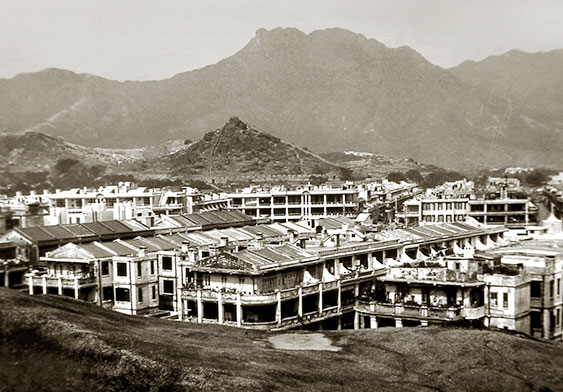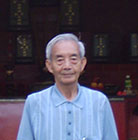
Pre-war tenement houses in Kowloon City
These 1930s constructions were among the first new buildings in and around Sung Wong Toi and Kai Tak Bund. During the Japanese occupation, Ng Hung On’s family lived in a similar three-storey tenement with supporting pillars-Hong Kong Memory Website
Pre-war tenement houses in Kowloon City
These 1930s constructions were among the first new buildings in and around Sung Wong Toi and Kai Tak Bund. During the Japanese occupation, Ng Hung On’s family lived in a similar three-storey tenement with supporting pillars-Hong Kong Memory Website
After their ancestral home was demolished, the family was forced to wander the streets
After the Japanese armies occupied Hong Kong, they razed Mau Chin to the ground, and resumed land for construction of roads and the nullah (Kai Tak Nullah). Ng Hung On moved to the Kwok Wah Textile Mill near Sung Wong Toi with his parents and brothers. The residents moved in with a bed or bed board. They were not allocated a room and the adults would screen themselves off with a curtain when they were sleeping. Later on, Ng Hung On’s family moved into a pre-war Chinese tenement on Kai Yan Road. The 3-storey building had 4 pillars, a kitchen and a toilet. Some clansmen of Kwong Yip Tso also lived there, such as Ng Wing Cheung and his family. Ng Hung On’s mother worked as a cleanser for the Japanese armies, carrying out duties such as turfing, cutting grass and feeding the horses with them, and disposal of horse excrement. She left his 3 sons at home when she went to work. Ng Hung On was 7 years old then and prepared the congee himself. On one occasion when he climbed up the stairs with a bowl of congee, he had an accident and had his feet scalded by the hot congee. The Chinese tenement was demolished less than one year after they moved in. Ng Hung On’s family was rehoused to Model Village in Kowloon Tong. His father grew vegetable but income was meager. He also did cleaning work for the Japanese army occasionally. They faced great living hardship.


 BACK
BACK  CLOSE
CLOSE 